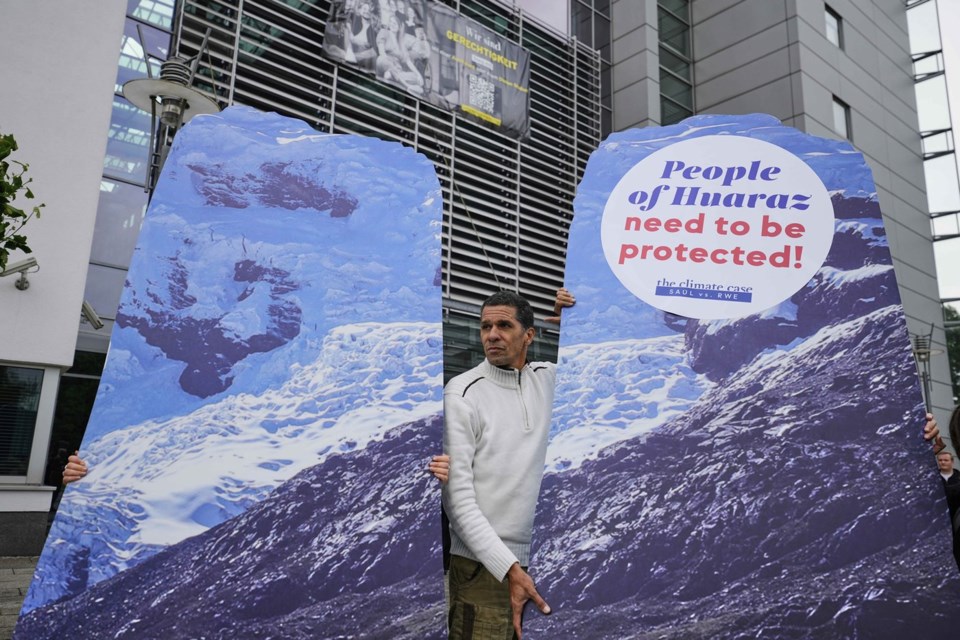A German court ruled against a Peruvian farmer Wednesday in a landmark case that claimed global warming fueled by energy company RWE 's historical greenhouse gas emissions put his home at risk.
Farmer and mountain guide Saúl Luciano Lliuya said glaciers above his hometown of Huaraz are melting, increasing the risk of catastrophic flooding.
RWE, which has never operated in Peru, denied legal responsibility, arguing that climate change is a global issue caused by many contributors.
Experts said the case had the potential to set a significant precedent in the fight to hold major polluters accountable for climate change.
Here's a look at other climate cases being watched closely:
An environmental group has asked the Dutch Supreme Court to uphold a landmark lower court ruling that ordered energy company Shell to cut carbon emissions by net 45% by 2030 compared to 2019 levels.
That ruling was overturned in November by an appeals court — a defeat for the Dutch arm of Friends of the Earth and other environmental groups, which had hailed the original 2021 ruling as a victory for the climate.
Climate activists have scored several courtroom victories, including in 2015, when a court in The Hague ordered the government to cut emissions by at least 25% by the end of 2020 from benchmark 1990 levels. The Dutch Supreme Court upheld that ruling five years ago.
___
The United Nations' top court held two weeks of hearings in December into what countries worldwide are legally required to do to combat climate change and help vulnerable nations fight its impacts.
The case was spurred by a group of island nations that fear they could simply disappear under rising sea waters, prompting the U.N. General Assembly asked the International Court of Justice for an opinion on “the obligations of States in respect of climate change.”
Any decision in the case, the largest in the court's history, would be non-binding advice and could not directly force wealthy nations to act, though it could serve as the basis for other legal actions, including domestic lawsuits.
In another advisory opinion requested by small island nations, the International Tribunal for the Law of the Sea last year said carbon emissions qualify as marine pollution and countries must take steps to mitigate and adapt to their adverse effects.
___
Colombia and Chile are awaiting an advisory opinion from the Inter-American Court of Human Rights on whether countries are responsible for climate change harms and, if so, what their obligations are to respond on human rights grounds.
A four-day hearing was held this month in the Brazilian state of Amazonas and an opinion is expected by the end of the year.
Much of the testimony focused on indigenous rights in Latin America, including whether industries violate their rights to life and to defend their land from environmental harm.
___
Dozens of U.S. states and local governments have filed lawsuits alleging that fossil fuel companies misled the public about how their products could contribute to climate change, claiming billions of dollars in damage from more frequent and intense storms, flooding, rising seas and extreme heat.
In March the U.S. Supreme Court rejected a lawsuit from Republican attorneys general in 19 states aimed at blocking climate change suits against the oil and gas industry from Democratic-led states.
And state supreme courts in Massachusetts, Hawaii and Colorado have rejected attempts by oil companies to dismiss lawsuits, allowing them to proceed in lower courts.
Even so, the Department of Justice recently sued Hawaii and Michigan to prevent the states from seeking damages from fossil fuel companies in state court for harms caused by climate change. The DOJ also sued New York and Vermont, challenging their climate superfund laws that would force fossil fuel companies to pay into state-based funds based on previous greenhouse gas emissions.
___
The Associated Press’ climate and environmental coverage receives financial support from multiple private foundations. AP is solely responsible for all content. Find AP’s standards for working with philanthropies, a list of supporters and funded coverage areas at AP.org.
The Associated Press


